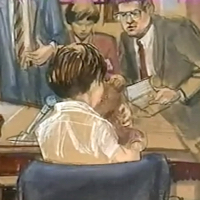Rascals case in brief
In the beginning, in 1989, more than 90 children at the Little Rascals Day Care Center in Edenton, North Carolina, accused a total of 20 adults with 429 instances of sexual abuse over a three-year period. It may have all begun with one parent’s complaint about punishment given her child.
Among the alleged perpetrators: the sheriff and mayor. But prosecutors would charge only Robin Byrum, Darlene Harris, Elizabeth “Betsy” Kelly, Robert “Bob” Kelly, Willard Scott Privott, Shelley Stone and Dawn Wilson – the Edenton 7.
Along with sodomy and beatings, allegations included a baby killed with a handgun, a child being hung upside down from a tree and being set on fire and countless other fantastic incidents involving spaceships, hot air balloons, pirate ships and trained sharks.
By the time prosecutors dropped the last charges in 1997, Little Rascals had become North Carolina’s longest and most costly criminal trial. Prosecutors kept defendants jailed in hopes at least one would turn against their supposed co-conspirators. Remarkably, none did. Another shameful record: Five defendants had to wait longer to face their accusers in court than anyone else in North Carolina history.
Between 1991 and 1997, Ofra Bikel produced three extraordinary episodes on the Little Rascals case for the PBS series “Frontline.” Although “Innocence Lost” did not deter prosecutors, it exposed their tactics and fostered nationwide skepticism and dismay.
With each passing year, the absurdity of the Little Rascals charges has become more obvious. But no admission of error has ever come from prosecutors, police, interviewers or parents. This site is devoted to the issues raised by this case.
On Facebook

Little Rascals Day Care Case
This Facebook page is an offshoot of littlerascalsdaycarecase.org, which addresses the wrongful prosecution of the Edenton Seven and other such victims.
Click for earlier Facebook posts archived on this site
Click to go to
Today’s random selection from the Little Rascals Day Care archives….
Oh, those consequences of imaginations run amok
Dec. 21, 2012
“In the accusatorial post-McMartin climate, day care providers… took measures to protect themselves from false allegations. They installed video cameras to record all of their activities, opened up private spaces to public view by taking down doors to bathrooms and closets and, fearing the act now could be misinterpreted, stopped hugging and holding their young charges.
“State legislatures… hurriedly mandated the fingerprinting and criminal records check of all current and prospective day care providers; state licensing agencies tightened regulations and by legislative fiat were given more teeth to enforce them. Yet insurance liability premiums soared, forcing many small day care centers out of business and many more, unlicensed and uninsured, to go underground.
“Heralded at the start of the (1980s) as playgrounds for children, day care centers were feared at its end as playthings of the devil.”
– From “The Devil Goes to Day Care: McMartin and the Making of a Moral Panic” by Mary De Young in the Journal of American Culture (April 1, 1997)
Second to none was North Carolina’s overreaction, highlighted by the creation of “interagency task forces.”
All molesters, please gather now on E. Eden Street
June 15, 2012
“How did such a large group of child molesters assemble? This is not New York, this is Edenton, North Carolina.”
– Edward B. Simmons, making his closing argument on behalf of Dawn Wilson (Jan. 14, 1993)
One less platform for ritual-abuse fantasizers
 April 27, 2012
April 27, 2012
Friday news roundup:
■ Darkness to Light, the Charleston-based nonprofit with the goal “End Child Abuse,” has responded to my request to disassociate itself from one of the last promoters of the ritual-abuse day-care hoax. This is from Erika Rowell, program coordinator for D2L: “After taking a long look at the Survivorship website we have decided to remove it from our resource list.”
■ The North Carolina Supreme Court’s latest release on petitions allowed and denied included no ruling on Junior Chandler’s appeal. Next possible release date: June 14.
■ The New York Times reports a jarring increase in the number of retractions published in scientific journals. The Times focuses on heavyweights such as Science and the New England Journal of Medicine, but I have to wonder whether – OK, hope that – this phenomenon might one day extend to the likes of the Journal of Child Sexual Abuse, the Journal of Psychohistory and Treating Abuse Today, all of which failed to apply professional skepticism to the abuse fantasies of their contributors.
How ‘Innocence Lost’ changed one viewer’s life

March 16, 2016
“Thank you for providing a site to keep this tragedy alive…. I was a daycare/preschool owner/administrator for 20 years ending in 1995. The primary reason I retired early was watching (“Innocence Lost”) on PBS and realizing anyone at any time could accuse me of abuse lies and my life and career would have been ruined….”
– From a letter from a Wisconsin reader
Such fears were not unfounded, of course – or uncommon.
![]()





